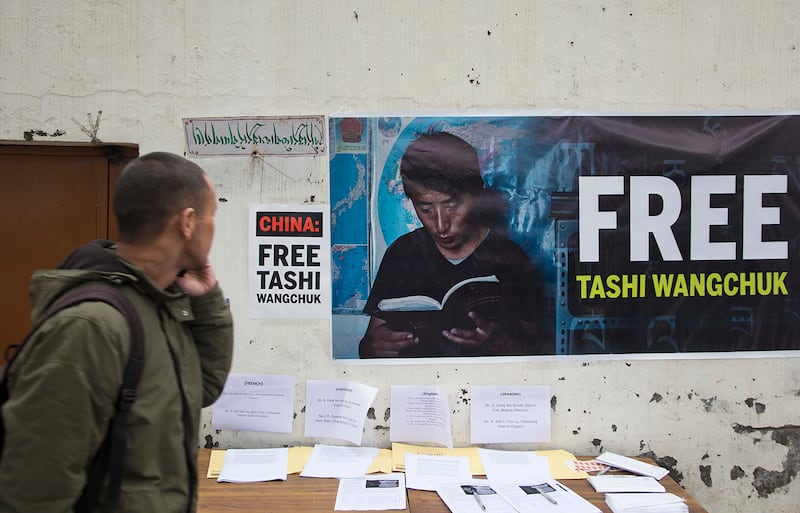Prominent Tibetan language rights advocate Tashi Wangchuk was detained for 15 days on charges of ‘disrupting social order’ and allegedly spreading false information on social media and is now under strict surveillance, RFA Tibetan has learned.
Wangchuk’s detention comes as China intensifies its policies to suppress — or even eradicate — Tibetan and other ethnic languages and cultures and replace them with Mandarin and Han Chinese customs.
According to a release notice issued by the Yulshul (in Chinese, Yushu) City Detention Center obtained by RFA, Wangchuk, 39, was arrested by the Internet Police Unit in China’s Qinghai province on Oct. 20. After an investigation, he was detained for 15 days in the Yulshul Tibetan Autonomous Prefecture until his release on Nov. 4.
The document, dated Nov. 4, said Wangchuk -- a former political prisoner -- was accused of posting “false information” on social media platforms since June, for “repeatedly insulting and ridiculing government departments” and “negatively impacting the online environment and public order in society” by allegedly distorting and rejecting government policies.
Despite his release, Wangchuk remains under strict surveillance and is being subjected to ongoing interrogation, said a source familiar with his situation, who spoke to RFA on condition of anonymity for fear of reprisals.
RELATED STORIES
New school for overseas Tibetan kids aims to preserve language
4 Tibetan teens detained for resisting going to Chinese schools
Tibetan monks’ phones seized after accusations of sharing news about school closures
A shopkeeper from the Yulshul township of Jyekundo, also called Gyegu, said Wangchuk was released from prison in January 2021 after he completed a five-year term for discussing language restrictions with Western media, but rights groups had continued to express concerns about his health and safety amid ongoing controls on his freedom.
‘Forced assimilation’
Maya Wang, associate China director at New York-based Human Rights Watch, said Wangchuk’s case reflects the Chinese government’s broader efforts toward assimilation.
“Tibetans who have pushed back for Tibetan language rights – notably Tashi Wangchuk – and for their rights to express themselves, practice religion and culture in the way they prefer, have been imprisoned and harassed for doing so,” Wang told RFA.
“This is all part of the Chinese government‘s efforts to forcibly assimilate what they consider to be ’ethnic minorities' and subsume them into what [Chinese President] Xi [Jinping] considers to be a rising Han Chinese nation,” she said.
Wang noted that the Chinese government has systematically replaced the Tibetan language with Mandarin as the medium of instruction in primary, middle and secondary schools, except for classes studying Tibetan as a language - treating it akin to a foreign language.

While China claims to uphold the rights of all minorities to access a “bilingual education,” Tibetan-language schools have been forced to shut down and kindergarten-aged children regularly only receive instruction in Mandarin Chinese.
Observers say such policies are aimed at eliminating the next generation of Tibetan speakers and part of a broader effort by the government to destroy Tibetans’ cultural identity. Similar policies are deployed against Mongolians in Inner Mongolia and Uyghurs in Xinjiang.
Earlier prison term
Since 2015, Wangchuk has been advocating against China‘s policies undermining the Tibetan language, calling for language protection as guaranteed in laws governing the country’s autonomous regions.
Wangchuk rose to prominence that same year through an interview with The New York Times about his efforts to sue local authorities in eastern Tibet after Tibetan language classes were canceled.
After the release of The New York Times documentary featuring his interview, Wangchuk was arrested in 2016 and tortured by Chinese authorities.
Since his release in from prison in 2021 Wangchuk has traveled throughout Tibet raising awareness of Chinese authorities’ suppression of the Tibetan language in schools, as well as petitioning government officials to defend and preserve Tibetan language and culture.
Activists and his lawyer say that Wangchuk has been under continued surveillance since his release.
In July 2023, human rights lawyer Lin Qilei said in a post to the social media platform X that he had met Wangchuk in Yushu, but their meeting and time together was cut short due to restrictions on their communication and local police pressure.
“Tashi Wangchuk’s case makes the harassment and scrutiny that former political prisoners face even more evident,” said Tenzin Khunkhen, researcher at the Central Tibetan Administration’s Human Rights desk.
Khunkhen also raised concerns about Wangchuk’s well-being, stating that his arrest and detention reflects the Chinese government’s ongoing crackdown on political prisoners in Tibet.
Additional reporting by Tenzin Dickyi and Dickey Kundol. Translated by Dawa Dolma and Tenzin Pema. Edited by Joshua Lipes and Malcolm Foster.
